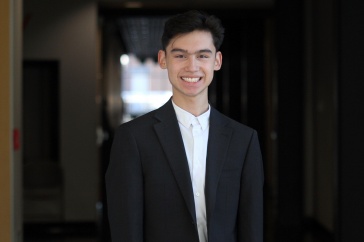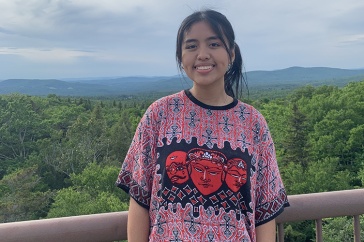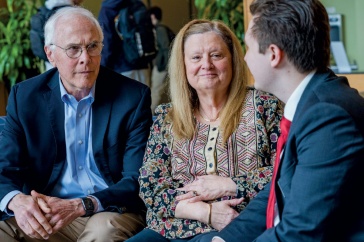Hamel Research Program Redefines Student Experience
|
Katie Blanchette '12 does intaglio printmaking, drawing with needle directly onto copper plates and woodcuts. >> Slideshow |
Creative artists don’t do research, right? Wrong.
The Hamel Center for Undergraduate Research defines research as the creation of new knowledge, whether that involves pipettes or paint brushes. “Whatever your faculty mentor did to get hired is what you do,” says Georgeann Murphy, Hamel’s coordinator for international research. “It doesn’t have to take place in a lab. It doesn’t have to take place in a library.”
|
Dreamers, Despots, and Dissidents As a first-year student, Cory McKenzie ’14 (above right) took a course called Soviet Dreamers, Despots, and Dissidents that ignited his interest in Russian Orthodoxy during the 20th century. At many schools, McKenzie might have had to put his curiosity on hold. Instead, he put it on speed dial and successfully applied for a Research Experience and Apprenticeship Program (REAP) fellowship. The fellowship enabled him to spend the summer after his first year researching the breakup and resurgence of the Russian Orthodox Church. Working under the supervision of UNH history professor Cathy Frierson, his project ultimately took him to religious sites and a museum in two states. “It’s a part of scholarship you don’t experience as much during the year,” says McKenzie, who’s majoring in history and philosophy. In addition to conducting library research at UNH, he toured the Holy Trinity Monastery in Jordanville, N.Y., and St. Vladimir’s Orthodox Theological Seminary in Yonkers, N.Y., where he interviewed religious leaders about the importance of each site to Russian Orthodox history. He also visited the Museum of Russian Icons in Clinton, Mass., which boasts the largest collection of Russian icons in North America. Throughout the process, he worked one-on-one with Frierson, drawing on her knowledge of Russian history and culture. When he had trouble making contact with the religious sites in New York, for instance, she assured him that wasn’t unusual. “She told me this was a Russian cultural trait,” he says. “It takes a lot of patience and perseverance to get in touch with them.” Eventually he received a warm, friendly email. After making that initial connection, he had no problems proceeding with his research — which Frierson also said was typical. He wrote several essays on his findings and is finishing an article about his project for Inquiry, UNH’s online journal of undergraduate research. Last fall, he came full circle: Frierson incorporated aspects of his research into a course she was teaching on Soviet history. |
Indeed, Hamel has awarded grants to students in 70 different majors — a majority all the majors available at UNH. Students have completed projects in studio art and music performance, filmmaking and creative writing.
For her Summer Undergraduate Research Fellowship last year, Katie Blanchette ’12 explored printmaking techniques not taught in introductory and intermediate courses at UNH. She usually met twice weekly with her faculty mentor, Professor of Art Scott Schnepf. “He was there just to help me,” says Blanchette, who’s pursuing a bachelor of fine arts degree. “It was really good just to sit down and talk to him about the printmaking process, to ask him about his work and get his thoughts and opinions on my work.”
Now she’s using some of the methods she learned last summer in her senior thesis, which consists mainly of small prints depicting everyday moments that are easily overlooked. Blanchette, who’s also taking courses toward her master’s degree in education, says her summer experience highlighted the value of experimentation in learning, including the process of trial and error and the need to challenge oneself to go beyond the familiar. “Most important is developing the ability to make your own decisions and to think for yourself where something could go next.”
Students from all disciplines are not only eligible to receive funding, they can do so almost as soon as they arrive on campus in their first year. A course called Student Research Experience enables students to earn academic credit while developing their research skills. Students ready for a more advanced experience can enroll in a higher-level course. Both courses provide as much as $200 to cover research expenses.
First-year students in the Honors Program may be nominated for the Research Experience and Apprenticeship Program (REAP), which pairs them with a faculty researcher during the summer after their initial year. The program provides a $3,500 stipend for a 10-week fellowship and up to $600 for expenses. Since its founding in 2007, 30 students have participated in REAP.
“It’s so valuable for our most talented freshmen to have their intellectual qualities recognized, rewarded, and encouraged,” says Professor of History Cathy Frierson, who has mentored several REAP students.
One of them is Cory McKenzie ’14, whose project last summer looked at the survival of the Russian Orthodox Church during the Soviet era (see profile below). He’s now applying for a second grant from the Hamel Center to explore why the Legislature repeatedly dismantled New Hampshire’s Superior Court during the 1800s. The opportunity to pursue his own research through the Hamel Center was part of what attracted him to UNH.
“No other schools I looked at seemed to have something quite like that,” he says.
Editor’s Note: This is the third in a three-part series looking at the impact of the Hamel Center for Undergraduate Research on student learning.
WRITTEN BY SONIA SCHERR, ’13G























































